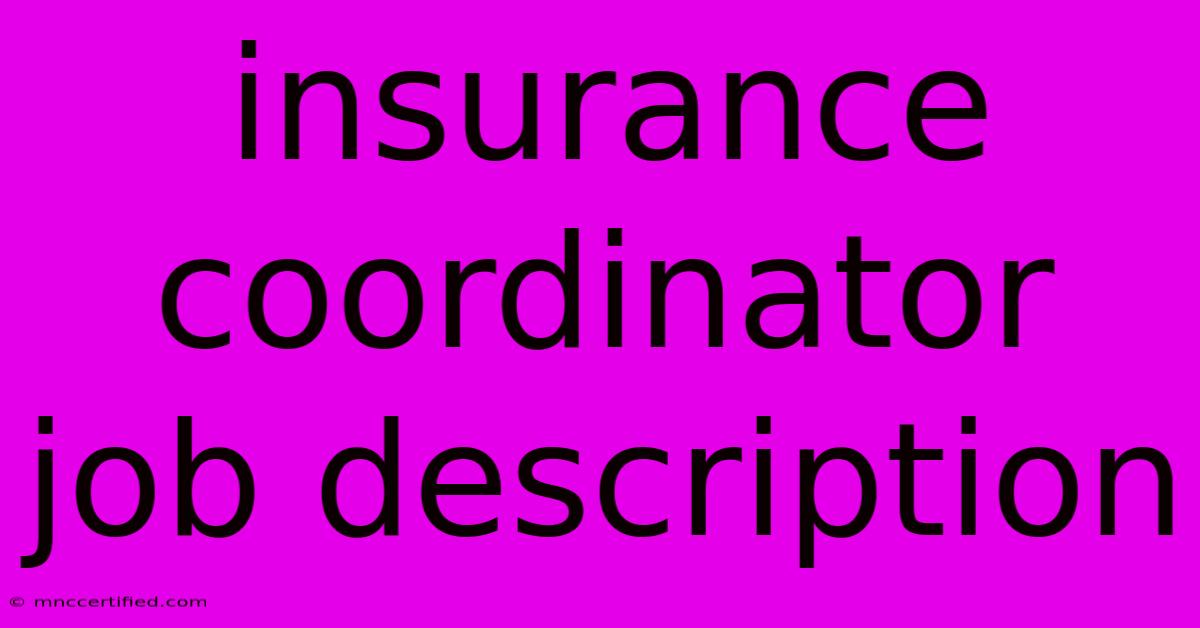Insurance Coordinator Job Description

Table of Contents
Insurance Coordinator Job Description: Your Guide to a Rewarding Career
Are you detail-oriented, organized, and passionate about helping others? Do you thrive in a fast-paced environment and enjoy the challenge of problem-solving? If so, a career as an insurance coordinator might be the perfect fit for you.
This article will provide a comprehensive overview of the insurance coordinator job description, outlining the essential duties, required skills, and career path opportunities.
What Does an Insurance Coordinator Do?
An insurance coordinator plays a crucial role in the healthcare system, serving as a vital link between patients, healthcare providers, and insurance companies. Their primary responsibility is to ensure accurate and timely processing of insurance claims and authorizations. This involves:
- Verifying insurance coverage: They meticulously review patient insurance information, confirm eligibility, and determine coverage limits.
- Pre-authorizing procedures and treatments: Insurance coordinators work closely with healthcare providers to obtain necessary pre-authorizations for procedures and treatments, minimizing delays and financial surprises for patients.
- Submitting claims: They prepare and submit accurate claims to insurance companies, ensuring all necessary documentation is included.
- Following up on claims: They track the status of claims, address any discrepancies, and advocate for patients to expedite the claim process.
- Handling billing and payments: They manage billing processes, resolve billing issues, and ensure timely payment from insurance companies.
- Maintaining patient records: They meticulously maintain patient insurance information and billing records, ensuring confidentiality and compliance with regulations.
- Communicating with stakeholders: They effectively communicate with patients, healthcare providers, insurance companies, and other relevant parties to address questions and concerns.
Essential Skills for an Insurance Coordinator
To excel in this role, you'll need a combination of hard and soft skills.
Hard Skills:
- Strong knowledge of insurance terminology and billing procedures: A deep understanding of different insurance plans, billing codes, and claim processing procedures is essential.
- Proficiency in medical billing software: Familiarity with industry-standard software, such as Epic, Cerner, or Meditech, is crucial for efficient claim processing.
- Excellent organizational and time management skills: Insurance coordinators must manage multiple tasks and prioritize effectively to meet deadlines.
- Strong attention to detail: Accuracy is critical in insurance coordination, ensuring all information is correct and complete.
- Computer proficiency: They must be comfortable working with computers, spreadsheets, and various online platforms.
Soft Skills:
- Excellent communication skills: Effective communication with patients, providers, and insurance companies is paramount.
- Problem-solving abilities: They must be able to identify and resolve billing errors, claim discrepancies, and other issues.
- Empathy and compassion: Understanding the needs of patients and providing support is crucial, especially during challenging times.
- Teamwork and collaboration: Insurance coordinators work closely with other healthcare professionals to ensure smooth operation.
Education and Training Requirements
While a bachelor's degree is not always required, a high school diploma or equivalent is typically necessary. Obtaining a certification in medical billing and coding can significantly enhance your job prospects and demonstrate your expertise.
Career Path Opportunities
The insurance coordinator role offers a stepping stone to various other positions within the healthcare field. With experience and further education, you can progress to roles like:
- Medical Billing and Coding Specialist
- Insurance Claims Examiner
- Patient Advocate
- Healthcare Administrator
Benefits of a Career as an Insurance Coordinator
- Job Security: The healthcare industry offers high job security, and insurance coordinators are in constant demand.
- Making a Difference: By ensuring smooth insurance processing, you directly contribute to patient care and financial stability.
- Diverse Learning Opportunities: The insurance field is constantly evolving, offering ongoing learning and development opportunities.
- Stable Salary: Insurance coordinators enjoy a stable income, with the potential for salary increases based on experience and qualifications.
Conclusion
A career as an insurance coordinator offers a rewarding and challenging path for those seeking a fulfilling career in healthcare. With the right skills and dedication, you can play a crucial role in ensuring patients receive the care they need without financial burdens.
Ready to embark on this fulfilling career? Start by researching insurance coordinator positions in your area, updating your resume, and exploring the necessary certifications and training programs to advance your career.

Thank you for visiting our website wich cover about Insurance Coordinator Job Description. We hope the information provided has been useful to you. Feel free to contact us if you have any questions or need further assistance. See you next time and dont miss to bookmark.
Featured Posts
-
Phone Number For Affordable Insurance
Nov 10, 2024
-
Livvy Dunne Responds To Sabans Vanderbilt Comments
Nov 10, 2024
-
Car Insurance Vs Motorcycle Insurance
Nov 10, 2024
-
At Fault Drivers Insurance Wont Pay
Nov 10, 2024
-
Wta Finals Gauff Wins Earns Record 4 8 Million
Nov 10, 2024